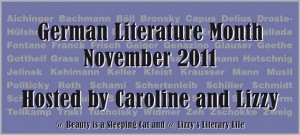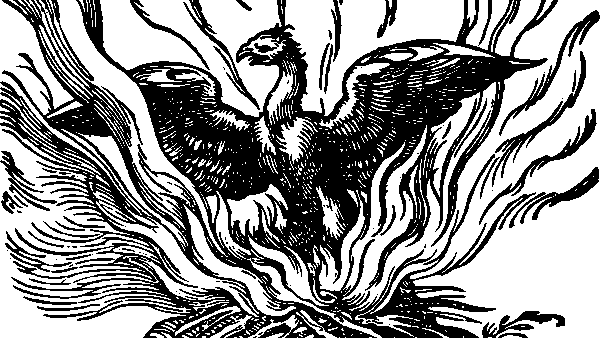I am participating in the readalong of Theodore Fontaine’s Effi Briest as part of German Literature Month. Here are my reactions to the first 15 chapters. Questions posed by Lizzy.
Q1: Welcome to the 1st German Literature Month Readalong! Had you heard of Theodor Fontane and Effi Briest before now? What enticed you to readalong with us?
This is my first readalong; normally I’m not much of a group joiner, and prefer to read what I want when I want. But I enjoy the blogs of the two organisers Caroline and Lizzy, so thought I would give it a try just this once. I’d never heard of Theodor Fontaine or Effi Briest either, so it’s all new territory for me!
Q2: Which edition/translation are you using and how is it reading?
I’m reading the Penguin Classics edition, translated by Hugh Rorrison and Helen Chambers. I haven’t read the introduction yet – I prefer to introduce myself to the book, and go back to read the official introduction at the end. One thing I do like about this edition is that there are informative notes at the end, but no footnotes in the text itself. I hate when fiction is footnoted – it makes it feel dry and academic, and interrupts the flow (I know I could ignore them, but I always have the instinct to follow them to see what I’m missing). This way is great – I can read and enjoy without interruption, but the information is there if I need it.
Q3: Is the novel living up to your expectations?
So far it’s exceeding my expectations. I don’t generally read the classics very much, as I prefer contemporary fiction. I was keen to give this one a try after hearing what people said about it, but still I wouldn’t say my expectations were sky-high. I’ve really enjoyed it so far, and found myself being drawn into the story right from the beginning.
Q4: What do you make of Effi Briest and Baron von Innstetten. What motivates them? What do you make of their match?
Effi and Innstetten seem to be exact opposites, corresponding more or less to the two sides of human nature – the free and natural versus the socially controlled. Effi is presented as an innocent child from the very start, playing in the garden with her friends before being called inside to be informed of her engagement. Innstetten is a buttoned-down bureacrat, who behaves very correctly but shows no trace of passion or spontaneity. When he seems on the point of saying something real, he checks himself and says “Let’s drop the subject. I must watch what I say in future.” What motivates him is social advancement; what motivates Effi is fun and adventure. There is also the huge age gap; Innstetten is Effi’s mother’s old flame. It seems like a disastrous match.
Q5: How are you reacting to Effi’s parents?
I get the impression that they are trying to do the right thing. Marrying your teenage daughter off to a man twice her age may seem shocking today, but I think that in the context of the day, it would be seen as a good match for Effi. They are presented as loving parents, close to Effi and not authoritarian at all. They themselves are far from a perfect match as a couple, and I get the impression that they have learned to co-exist reasonably happily by reaching a truce. I think they imagine that Effi will reach a similar kind of understanding with Innstetten one day. I thought it was interesting how Effi’s mother tried gently to prepare her for marriage by making her more realistic – Effi had wanted to take a “beautiful and poetic” red lantern and Japanese screen to her new home, but her mother said “In life we must be cautious”.
Q6: Are there any secondary characters to whom you are particularly drawn? Any to whom you are adverse?
Gieshubler is a very sympathetic character, more or less the only person in Kessin who seems genuine and humane – most of them are concerned with social advancement.
Q7: Effi Briest was originally serialised in 6 parts. I’m assuming that its 36 chapters were published in 6 monthly parts of 6 chapters each and the novel so far seems to bear this out. How does the mood of the first part (chapters 1-6) contrast with that of the second (chapters 7-12)?
The first part is a time of innocence, in idyllic Hohen-Cremmen. Then it’s the honeymoon and the initial arrival in Kessin, when Effi is still enthusiastic. But chapter 7 begins with Effi encountering the cold light of day in an unfriendly house, with her husband absent. Innstetten’s absence is a foreshadowing of how Effi’s life in Kessin will be, and it’s when he’s absent for longer periods that she starts to see the ghost of the Chinaman and get truly terrified.
Q8: We finished our first reading at the end of chapter 15 or the middle of part 3. Where is Effi in terms of her psychological development and how does this bode for the future?
We’ve seen Effi’s increasing loneliness and nervousness, and have seen signs of her growing disappointment with Innstetten (for example when they’re travelling together and she complains that he just smoked his cigar and ignored her the whole time, “frosty as a snowman”). Nevertheless she still trusts and respects Innstetten, and feels that if she’s unhappy it’s her fault rather than his, and she needs to try to be better, to live up to his high standards and be worthy of him. It’s an interesting point in her development, and a good point at which to draw week 1 of the readalong to a close.
Thanks to Lizzy for the questions and Caroline for being joint-organiser! Look forward to the rest of German Literature Month. If you’re participating, please leave me a comment. Did you have any different reactions to the first 15 chapters?
Read my posts for the other parts of the readalong:




There are 14 comments
I like a lot the w you compare Effi and Instetten. I also think she is a fun an adventure person but she thinks she isn’t. She thinks, she will be happy with social climbing. She has her doubts but tries to push them aside.
I see the parents in a very different light. I hate the mother big time. The father seems much nicer and sympathetic. Effi is 17. That is very young, even in those times, I think. And the idea that Instetten was and may still be in love with the mother is a bit revolting.
I’m very glad you like it and would have thought you would. Fontane is the opposite of a stuffy classic. He aged very well. Even in German it’s a lovely read (the German language ages much faster as you know).
Yes, Caroline, it seems to me that Effi sees the social climbing thing as a fun adventure in her imagination – balls and soirees and meeting princes – but ultimately she has no interest in it. Probably she also wants to do the ‘right’ thing and make her parents happy, so pushes her doubts aside. It’s interesting with the parents, and I noticed that Lizzy also saw them in quite a different light. I can certainly understand that, but I suppose I thought that in those days it was usual for a girl’s parents to think more about her marriage prospects than her husband, and I thought they were doing what they thought was right for Effi. I don’t know much about 19th century Germany, but that was just my assumption. You’re right, definitely not stuffy at all 🙂 Maybe I’ll try it in German one day – I’m quite rusty, but it might be a good way to get back into the language.
I meant “more about her marriage prospects than her happiness“
He would be a great choice to get back to German. He is an accomplished writer but one who has adopted a “less is more” style. Not a refined vocabulary but spot on, no complicated sentences but not simplistic either.
There’s something dangerously over-identificatory about giving your daughter to your old flame, isn’t there? I’m reading Elizabeth von Arnim’s brilliant novel, The Pastor’s Wife, at the moment, which is another book about the dreadful things that happen to women who’ve been brought up mindlessly complicit with the desires of others, to the point that they are out of touch with their own. In this case the difficulties of the family background are spelled out, whereas it sounds like Effi Briest suggests them through the actions of the characters. It does make me shiver with relief to think that parents don’t get to choose life partners for their children anymore (or not in most parts of the world). I read Effi Briest at university years ago and loved it – if I didn’t have too many committments this month, I’d have joined in. Hope you carry on enjoying it.
There’s something very creepy about giving your lover to your daughter, personally speaking 😉
I think that Effi is a little more of a social climber than you have described here. She has been brought up for this, and she won’t be phased by the ambitions of von Innstetten; rather, it is the boredom of married life and her absent husband that she cannont cope with.
I will come back and read your post and comment on it this weekend, because I am scared of spoilers 🙂 Glad to know that you are enjoying ‘Effi Briest’. Happy Reading!
Thanks for the comments. I haven’t been online this week so apologies for not replying sooner.
Caroline, definitely enjoying the “less is more” style, and it would be interesting to see how that compares in the original German.
Litlove, hello! The Pastor’s Wife sounds interesting – haven’t come across that one before. I am also drowning under commitments this month, so can sympathise 🙂 I’m enjoying the book, though, so glad I signed up. My posts are not as detailed as I’d like, but am enjoying the readalong anyway.
Hi Tony, thanks for visiting! I agree she’s been brought up for that world, but I don’t think it’s really in her nature to care about things like that. When she moves to Kessin, she finds the social hierarchy stifling and doesn’t try to suck up to the powerful families in town. The only person she really identifies with is old Gieshubler, who has not much status at all. Still, I can see your point. Differences of interpretation are what make things like this interesting 🙂
Hi Vishy, thanks for stopping by 🙂 Looking forward to reading your osts and getting your thoughts on Effi Briest when you’ve caught up!
I was wondering if anyone but me had found creepy that Innstetten had been the mother’s lover until I read the comments. That shocked me and I think it’s shocking, even for the time.
Otherwise, I agree with you. The parents mean well in their choice of a husband, they choose someone honest with a good situation. Innstetten isn’t a bad man (he’s not violent, doesn’t drink, doesn’t cheat on her…) he’s just not the right man for her. He’s not fun at all. Fontane says it somewhere, he’s not a lover.
Yeah, maybe I was making too many allowances for things being different in those days. I think I was also influenced by the reactions of the characters in the book – none of them reacted in a way I’d expect people to do today, so I thought maybe it wasn’t such a big deal then. But it looks as if I was alone in thinking that!